This volume presents the various ways in which the study of gender makes a difference in archaeological research, the archaeological academic milieu and the wider public´s thinking about gender and considers avenues of future development. It addresses questions such as why gender matters for archaeology, while examining gender from various angles (including aspects such as subjectivity, embodiment, diet, multifaceted perspectives and intersectionality) and in various periods (prehistory, Ancient Egypt, Roman antiquity, the Middle Ages and the modern and contemporary periods). It also discusses the relationship between archaeology and other academic fields involving the study of gender, as well as representations and debates on gender in the media.
The theme gender and change in archeology´ emerged out of concerns voiced within the Archaeology and Gender in Europe´ (AGE) working community of the European Association of Archaeologists (EAA) with respect to the future of gender archaeology. This book unites researchers of gender archaeology from two perspectives: that of gender archaeologists from academic milieus where the study of gender has long been established and who in the meantime came to feel that this avenue of inquiry had become predictable and lost its provocative power, and that of gender archaeologists from countries where this field was only recently introduced and who, while more enthusiastic about the utility of gender archaeology, are concerned with how to disseminate it among skeptical peers. Both groups of archaeologists mainly argue that, four decades on, the study of gender in archaeology is still able to generate considerable change in our understanding of past and present-day societies. The volume is primarily of interest to archaeologists and researchers of gender studies.



